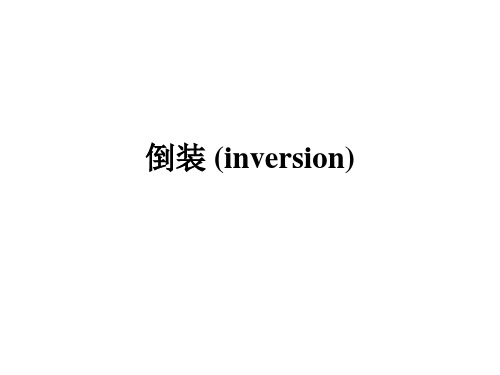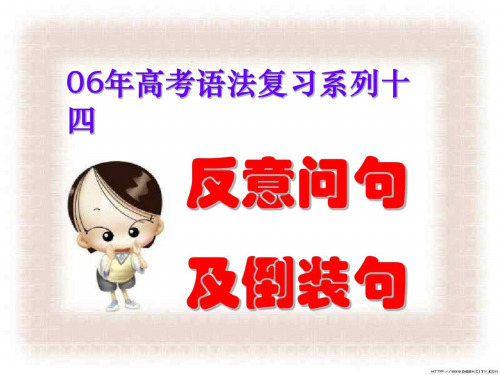高三英语反意问句和倒装句
- 格式:pdf
- 大小:2.00 MB
- 文档页数:8


一、反意疑问句的一般情况1.当陈述部分的主语是:等everyone, everybody, someone, no one, nobody, somebody合成代词时,附加疑问句的主语非正式文体中往往they用。
(也可以按语法一致原则用单数。
)2.当陈述部分以one不定代词做主语时,附加问句的主语在正式常场用one,非正式场合用he。
3.当陈述部分的主语是不定式、动名词、从句、this或that,附加疑问句的主语用it。
(是those, these 则用they)4.当陈述部分的主语是表示物的不定代词everything, anything, nothing等,附加问句的主语用it。
5.陈述部分带有否定词或半否定词,例如:never, hardly, scarcely, seldom, no, none, no one, rarely, nowhere, nothing, nobody, few, little等,附加疑问句的动词要用肯定形式。
6.如果陈述部分中的否定词仅带有否定的前缀或后缀,那么该陈述句应作肯定句处理,附加疑问句应用否定形式。
二、常见句型的反意疑问句7.当陈述部分是there be 存在句型时,附加疑问句的主语也用there。
8.感叹句的附加疑问句,其谓语要求用否定句。
9.祈使句后面的附加疑问句问题A) 祈使句是否定形式,附加疑问句只能用will you。
B) 祈使句是肯定形式,附加疑问句用肯定、否定均可。
C) Let开头的祈使句要注意:1.Let’s 在意义上包含谈话的对方在内,表示提出建议或征求对方意见,其反意疑问句往往用shall we。
2. Let us 在意义上一般不包含谈话的对方在内,表示请求对方允许做某事的含义,let 有allow的意思。
附加疑问部分用will you。
3. Let me 开头表示请求,附加疑问句用will you,或用may I。
三、复合句的反意疑问句10.当陈述部分是一个(带that引导宾语从句的)主从复合句时,附加疑问句的主谓要和主句的主谓保持对应关系。


高中英语语法练习反意疑问句和倒装句第一篇:高中英语语法练习反意疑问句和倒装句高中英语语法练习-反意疑问句和倒装句1.It’s the third time that John has been late, ____? A.hasn’t he B.isn’t he C.isn’t it D.hasn’t it2.Let’s take a rest, ___________.A.will we B.shall we C.shan’t weD.won’t we 3.Let us pass, _________? A.shan’t we B.shall we C.won’t we D.will you 4.Wait a minute, __________? A.shall you B.will you C.do you D.don’t you 5.The suit’s finished, __________?A.doesn’t itB.isn’t itC.haven’t youD.hasn’t it 6.He’s posted the letter, _________he?A.isn’tB.doesn’tC.hasn’tD.wasn’t 7.They’d go with us, __________?A.wouldn’t theyB.didn’t theyC.hadn’t theyD.couldn’t they 8.What fresh air, ________? A.is it B.does it C.isn’t itD.doesn’t it9.The Emperor’s clothes became the talk of the whole city, _________? A.did it B.didn’t it C.did they D.didn’t they10.Mr.And Mrs.Turner work in this hospital, ________? A.are they B.aren’t they C.do they D.don’t they 11.She has breakfast at six every day, ________? A.has she B.hasn’t she C.does she D.doesn’t she 12.Nothing seems to please her, _________? A.does it B.doesn’t it C.is it D.isn’t it 13.She never tells a lie, ________?A.does sheB.doesn’t sheC.is itD.isn’t it 14.You hardly know ea ch other, _________? A.do you B.don’t you C.have you D.didn’t you 15.The man in blue must be your brother, _____? A.mustn’t he B.needn’t he C.isn’t he D.is he 16.I don’t think he will come to our party, _____? A.will he B.won’t he C.does he D.do I 17.I suppose he’s serious,___________? A.do IB.don’t IC.is he D.isn’t he18.Wang said that he was not there then, _____? A.did heB.didn’t heC.was heD.wasn’t he 19.You daren’t say that to him, _________?A.dare youB.do youC.daren’t youD.don’t you20.You must have read about Dickens long ago, __________?用心爱心专心A.mustn’t youB.haven’t youC.can’t youD.didn’t you 21.You’d better not smoke here, ________? A.will you B.shall you C.have you D.had you 22.There isn’t going to be a volleyball match next week, __________? A.is it B.isn’t it C.is there D.isn’t there23.There used to be a church behind the cemetery,_____________? A.didn’t there ed there edn’t It D.didn’t it 24.What a lovely day, _________? A.doesn’t it B.hasn’t it C.won’t D.isn’t it 25.You must have been there, ____________? A.have you B.did youC.haven’t youD.didn’t you 26.That is your school, ___________? A.isn’t that B.mustn’t itC.isn’t itD.won’t it 27.She dislikes this skirt, _________________? A.doesn’t she B.does she C.isn’t sheD.is she 28.No one can stop us from going there, ______?A.can’t itB.can theyC.can’t theyD.can one 29.---Where is your father?---Oh, __________.A.here comes heB.here does he come C.he here comesD.here he comes 30.Look, _________.A.here the bus comes B.here is the bus coming C.here comes the bus D.here the bus is coming 31.________ , I would have phoned you.A.If I knew it B.Had I known it C.If I know itD.Did I know it 32._________ in the river yesterday, the boy _________.A.Were Mr Black not;would not be drowned B.Were Mr Black;would be drowned C.Had Mr Black not been;would have been drowned D.Hadn't Mr Black been;would have drowned 33.---It was cold yesterday.---__________.Which of the following is wrong? A.So it was B.So is it today C.So was it the day before D.So it did 34.---She's passed the entrance examination.---____.A.So am I B.So have I C.So I have D.Also I have 35.________ that he found it difficult to stop at the red light.A.So fast he was driving B.So fast he drove C.So fast was he drivingD.So fast drive he 36.Hardly ___________ the railway station when the train started.A.did reach B.had I reached C.I reached .I had reached 37.No sooner _________ asleep than she heard a knock at the door.A.she had fallen B.had she fallen C.she had fell D.had she fell 38.Only after his death __________ considered correct.用心爱心专心 A.was his theory B.his theory was C.did his theory D.had his theory 39._________ his appearance that no one could recognize him.A.So was strange B.Was so strange C.So strange was D.Strange so was 40.__________ about her illness and still worked very hard.A.She knows little B.Little did she know C.Little does she know D.She didn't know something 41.Only when the line was fixed _________ from floating away from the spaceship.A.could he keep B.he could keep C.he could be kept D.could he be kept 42.__________ , she wanted to buy her husband a Christmas gift.A.As she was short of money B.Though money is short C.She was short of money D.Short of money as she was 43._________ about the universe up till now.A.We know quite a lotB.Only little we have knownC.Very little have we knownD.So much we do know 44._________ , she was very brave.A.Girl as she was B.As she was a girlC.A girl as she was D.Girl as was she 45.Such _________ the results of the experiments.A.is B.was C.are D.as be 46.Albert Einstein cared little for money.___________ Professor Wang.A.Either did B.So was C.So did D.Neither did 47.____ there no gravity, there would be no human beings on the earth.A.If B.If was C.If not D.Were 48.Only when ________ the painting _________ decide whether the painting is worth buying.A.the sees;he can B.does he see;can he C.he sees;can he D.sees he;he can 49.On the wall ___________ two large portraits.A.hangs B.hang C.hangedD.are hanging 50._________ it rain tomorrow, we would have to put off the visit to the Yang pu Bridge.A.Were B.Should C.Would D.Will 参考答案:1~20: CBDBB CACDD DAAAC ADBAD 21~40: DCADC CABDC BCDBC BBACB 41~50: DDCAC DDCBB用心爱心专心 3第二篇:反意疑问句练习学无涯助你蟾宫折桂反意疑问句He is young, ______?A.hasn't heB.doesn't heC.isn't heD.wasn't he—Your sister isn't a nurse.is she?—________.She teaches English in a middle school.A.No, she isn'tB.Yes, she isC.Yes, she isn'tD.No, she isThe old man had to do all the farm work himself, ________?A.did heB.had heC.didn't heD.hadn't heThere are hardly any people, ______?A.are theyB.aren't theyC.are thereD.aren't thereLet us go shopping, _____?A.will youB.shall weC.do youD.do weLet's go shopping, _____?A.will youB.shall weC.do youD.do weThe students had to finish their homework on time, _______?A.didn't theyB.must theyC.did theyD.hadn't they—She didn't come to school yesterday, did she?—_____.Though she was not feeling very well.A.No, she didn'tB.Yes, she wasC.No, she wasn'tD.Yes, she didShe can hardly work out the Math problems, _____ she?A.doesB.canC.can'tD.doesn't—You used to be quiet, _____ you?—Yes, and I used to be very shy.A.wasn'tB.didn'tC.aren'tD.haven't—You used to wear T-shirts and jeans, didn't you?—_________.A.Yes, I didB.Yes, I usedC.No, I don'tD.Yes, I do—Jerry hardly ever walks to school, does he?—_______.He always rides his bike.A.Yes, he does.B.No, he doesn't.C.Yes, he doesn't.D.No, he does.Your friend Lili used to play the piano, _______?书山有路勤为径,学海无涯苦作舟。


高考英语复习专题13 倒装句知识点归纳总结英语的基本语序是“主语+谓语”,如果将谓语的一部分或全部放在主语之前,这种语序叫倒装。
倒装既是一种语法手段,也是一种修辞手段,用于表示一定的句子结构或强调某一句子成分。
一.倒装的原因A.语法倒装由于语法结构的需要,将谓语的全部或一部分移到主语之前。
1.一般疑问句当我们把一个肯定句转变为疑问句时,常把肯定句中的助动词或情态动词放在句首。
这类助动词或情态动词包括:be,have,can,do,shall,will,may,must,dare,need,ought或used 等。
He will do it.——Will he do it 他会做这件事吗?This is my mobile phone number.——Is this your mobile phone number?这是你的手机号码吗?提示:如果肯定句中没有助动词或情态动词时,我们可以在句首用do 的某种形式,以构成倒装语序。
Jack likes to eat fish. 杰克喜欢吃鱼。
——Does Jack like to eat fish 杰克喜欢吃鱼吗?2.特殊疑问句特殊疑问句的构成:特殊疑问词+ 一般疑问句What does he like to eat 他喜欢吃什么?When will they go to the Great Wall 他们什么时候去长城?Where did you go last night 昨晚你去哪里了?提示:如果疑问代词在句中做主语,句子不要倒装。
Who is not coming to dinner tonight 今晚谁不来吃饭?3. 反意问句在反意问句中,用一般疑问句的形式,前后两分句的主语,人称要一致。
前一分句是肯定,反意问句用否定形式,并一定要缩写;前一分句是否定, 反意问句用肯定形式。
Everything is ready, isn't it 一切都准备好了,是吗?Bobbie seldom got drunk, did he 博比很少喝醉,是吗?You had a wonderful time last night, didn't you 昨天晚上你玩得很愉快,是吗?4.感叹句英语中的感叹句有时也通过倒装的形式来表达。
反意疑问句和倒装句*Inconsolable 帅编辑高三12班资料一、反意疑问句(disjunctive questions/ tag questions)1.前一句是肯定句,后面要用否定问句;前面是否定句,包括句子里带有否定意义的词如never, seldom, hardly, scarcely, rarely, few, little, no, nothing, none 等,后面要用肯定问句。
eg. He has made few friends in his class, has he?You seldom meet with this kind of matter, do you?She said nothing at the meeting, did she?但是要注意,impossible, dissatisfy, uncomfortable这类词不是否定词。
eg. He is impossible to finish the work by himself, isn’t he?The result of the maths exam dissatisfied you, didn’t it?You failed to pass the test, didn’t you?2.前后的人称要一致,但后面的问句中只能用代词,不能用名词。
如果前面的主语是everything, anything, something,nothing那么在问句中用it作主语;如果前面是everyone, everybody, no one, nobody, someone, somebody, anyone, anybody, those, all(指人)等词作主语,那么后面问句可以用he或者they作主语,现在用they更加普遍。
eg. Everything is ready, isn’t it?Nothing can prevent him from working, can it?Everyone in the village knew the man, didn’t they/ he?如果是there be的句型,那么后面的问句就用引导词there。
2010高考二轮复习英语教案专题十三倒装句式和反意疑问句【专题要点】倒装句式和反义疑问句考点概览:1.否定副词放在句首引起倒装;2.so/neither/nor+助动词/情态动词/系动词+主语结构;3.表示方位的介词短语和副词out, in, away, off等放在句首引起全部倒装;4.only+状语从句和not until从句放在句首,主句引起部分倒装,从句不倒装;5. 反意疑问句的一般情况;6. 常见句型的反意疑问句;7.复合句的反意疑问句;8.关于情态动词的反意疑问句。
【考纲要求】高考试题每年都要涉及句法知识,这些特殊的句型结构,每年单项填空题都会出现1—2道。
考纲要求对这些句型结构的往往是以测试它们中的特殊结构为主,例如倒装句中否定副词位于句首;as引导让步状语从句的倒装;省略if的虚拟条件句等。
反义疑问句往往要求掌握前肯后否,前否后肯的基本用法以及反义映疑问句的回答,掌握祈使句、主从复合句、表示猜测的句式的反义疑问句,把握反义疑问句前后时态和人称的一致特点。
【教法指引】近年来,特殊句式已经成为高考的热点,倒装句和反义疑问句每年都有涉及,而对于倒装句式的考查命题人越来越重视,他们加大了对句子结构和知识面的考查,同时注重考查知识之间的交叉和语法知识的力度,以及句式的变化,估计今后高考试题不会降低对这些特殊句型结构的考查力度。
这就要求我们在平时的复习和备考中注意总结,全面把握,深入研究。
因此教师在引导学生复习倒装句和反义疑问句句式时要注意如下几点:1.含有否定意义的副词放在句首引起的部分倒装2.含有否定意义的连接词置于句首引起的部分倒装3.“so(nor, neither)+助动词+ 主语”与“so(nor, neither)+主语+助动词”之间的区别以及与“ so + 主语+ 助动词”的句式区别Everyone is in the classroom, aren’t they?Everything begins to grow in spring, doesn’t it?Nobody will go, will they?8. 当陈述部分有never,seldom, hardly,few,little,barely, scarcely, nothing 等否定词时,后面的疑问句则表示为:There are few apples in the basket, are there?He can hardly swim, can he?They seldom come late, do they?9. 当陈述部分是I think 加从句时,疑问句应和从句的人称时态保持一致。